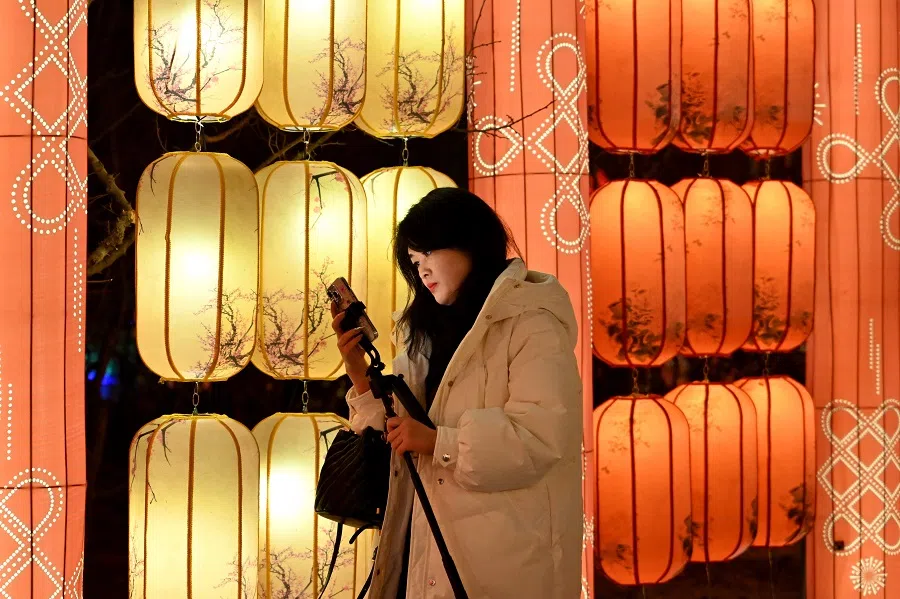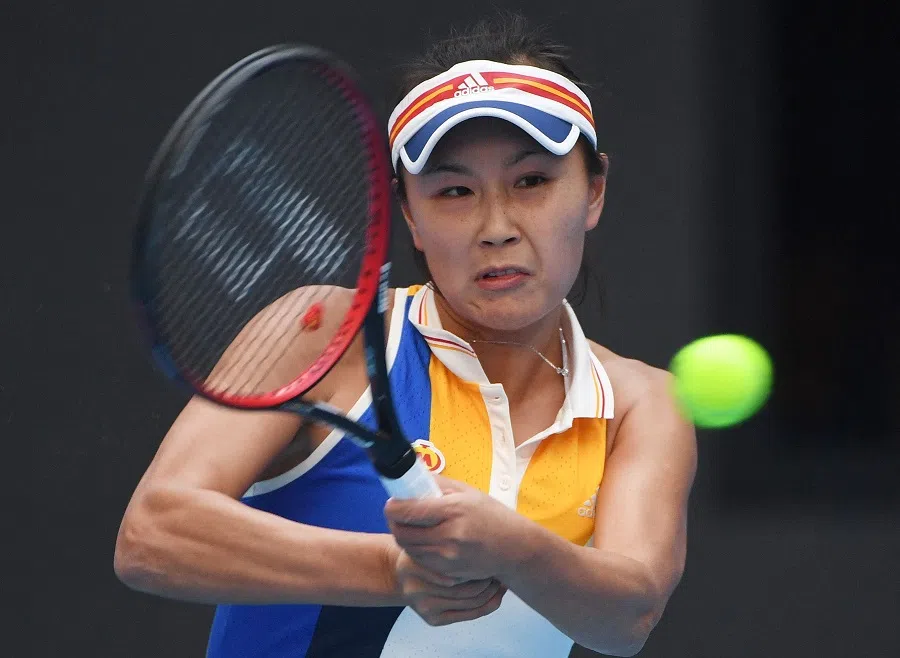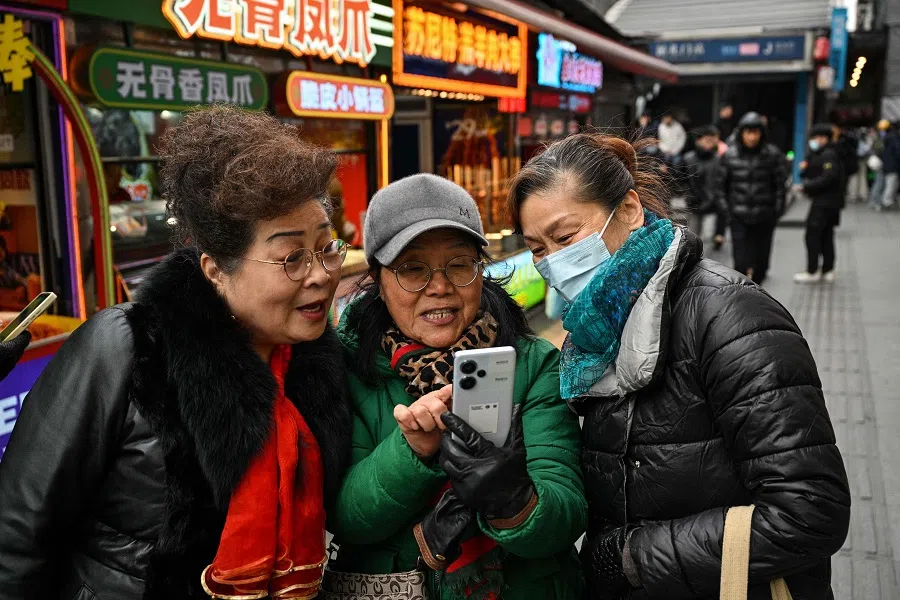[Big read] China women’s long march towards equality

The advent of social media has been a double-edged sword for women’s rights and gender equality movements in China. Though social media helps promote awareness of such issues, it also enables reactionary resistance to these movements and even misogynistic abuse. Lianhe Zaobao journalist Miao Zong-Han discusses the issue.
Looking back on 2024, women’s rights undoubtedly remain one of the most widely discussed and controversial hot topics in China. In a recent incident, Wang Xianju, a professor at China’s Renmin University, provoked outrage after he publicly asked how to make women graduates “obediently and submissively have children”.
The incident occurred after a speech by Erlan Qarin, state counsellor of Kazakhstan, during his visit to Renmin University. At the question and answer session after the speech, Wang, a well-known expert on Russian and Central Asian affairs and deputy director of the Eurasia Social Development Research Institute at the Development Research Center of the State Council, was invited to comment.
Many pointed out that Wang’s remarks objectified women and reflected the dated thinking of Chinese feudalism, depicting women undergraduates as “reproduction machines”.
How to make a woman listen
Wang said he had just been to Kazakhstan and noticed children everywhere. He praised the effectiveness of government measures in boosting Kazakhstan’s birth rates and reflected on the situation in China. “Modern women comrades in China are not willing to get married or have children, no matter what their parents or leader say,” he lamented. “You can mobilise and counsel her, but she won’t listen.”
Wang, expressing curiosity about how Kazakhstan had succeeded in boosting birth rates, asked how Kazakhstan had gotten women to give birth after graduation. “Why are they so obedient and willing to have children, early and often?”
Qarin responded that he has six children, but “none were forced”. He stressed, “Don’t force women to have children, or try to change her and make her do what she doesn’t want to do.”

The full text of the Q&A, published online, sparked outrage. Many pointed out that Wang’s remarks objectified women and reflected the dated thinking of Chinese feudalism, depicting women undergraduates as “reproduction machines”. A large number of online comments also advocated reproductive rights for women.
Another example of an issue that generated discussion online occurred in early November 2024, when several women online content producers in China started a “sanitary napkin challenge” campaign online. One after another, they shared measurements of the size of sanitary napkins, the tax cost, and pH value of the products. They found that almost all manufacturers had short-changed consumers by making their products as small as possible within the permissible margin of error stipulated in national standards for sanitary napkin sizes.
The topic sparked debates online. Even official news outlets like Xinhua News waded into the controversy, publishing articles critical of manufacturers and calling upon official standards to do away with “grey areas”, so that women can be confident that the products they purchase accurately reflect claims made on packaging.
‘Delusional overconfident men’: comedian’s joke ignites heated debates
The incidents described above show that the Chinese public is increasingly paying more attention to safeguarding women’s rights and interests. But in October last year, the controversy surrounding women’s rights descended into a gender war and resulted in a boycott.

In a 2020 stand-up performance, comedian Yang Li joked, “How can some men have so much self-confidence even though they are so average?”. She mocked the tendency of such men — who possess an extraordinarily misplaced sense of self-belief and lack the self-awareness to recognise that they are decidedly common and unexceptional — to hold potential partners to exacting standards and believe (falsely) that many women are interested in them.
It became an internet meme, but drew criticism and ire from many men who felt attacked by her incisive observations.
Fast forward to 2024 and the sentiments have yet to dissipate. Instead, they have intensified. On October 14, Chinese online shopping platform JD.com invited Yang Li and other stand-up comedians to promote their Double 11 sales promotion campaign. However, the event was boycotted by some resentful men, who stated their refusal to shop on JD.com and threatened to cancel their membership to the platform’s privilege club PLUS.
The hullabaloo drove JD.com to issue an apology. They also withdrew all promotional material featuring Yang and announced that they had no plans to work with Yang in the future. The comedian herself also took down her own Weibo posts about the event.
Despite the growing prevalence of discussions on women’s rights in China, the incident reflects the increasing pressure used to suppress such topics.
“You men have stepped on me countless times, but you react in such a disproportionate manner the one time I hit back. We women have been repressed our entire lives. You have no idea what we have been putting up with.” — Yang Li, a comedian
Rising hostility and resistance towards women’s rights organisations and activists
With regards to misogyny and whether antagonism between the sexes is worsening in China, Ding Yu, associate professor in the Department of Sociology and Social Work at Sun Yat-sen University, said in an interview with Lianhe Zaobao that as education levels rise, more avenues for observing gender inequality have become available to people.
From Ding’s previous experience in academic dialogues, she observed that as the long-term beneficiaries of gender inequality, men have less empathy for the injustices women suffer and are unaware of the general conditions women face, making it unlikely for them to reflect on the reasons for Yang Li’s words. For women, however, these discussions have struck a chord.
For instance, she said Yang Li’s plight of being boycotted because of her comments resonated with women. Yang herself observed, “You men have stepped on me countless times, but you react in such a disproportionate manner the one time I hit back. We women have been repressed our entire lives. You have no idea what we have been putting up with.”

Ding Yu remarked that when online, people tend to follow controversies indiscriminately and are eager to hop on the bandwagon. “Everyone piles on their comments, creating a lot of noise that drowns the issue. However, very few have thought critically about the root problems of the issue.” Social media therefore amplifies public attention, adding fuel to the fire of existing gender conflict.
Aside from stand-up comedians, those involved in women’s rights organisations have even more firsthand experiences of the antagonism these issues trigger.
Chinese women’s rights activist Feng Yuan, named one of the top 100 most influential women globally in 2024 by BBC in December, has been involved in the movement since 1980. In 1995, she witnessed the United Nations Fourth World Women’s Day commemoration event in Beijing. Over the years, she has launched several initiatives for women in media, AIDs and HIV prevention, leadership building for rural women and other programmes.
She has also led efforts to combat domestic violence. An advocate for anti-domestic violence legislation, she has been involved in the establishment of the anti-domestic violence network since 1998, as well as capacity training and care services for victims of domestic violence. In 2014, she became a founding director of Equality Beijing, a women’s rights organisation, and established China’s only English and Chinese helpline for gender-based violence available round the clock.
... one factor contributing to the gender war is the lax treatment of misogynistic viewpoints on China’s social media, despite the sophistication of social media censorship on other matters. — Feng Yuan, a Chinese women’s rights activist
Misogynistic behaviour still tolerated
In an interview, Feng Yuan said she has observed that the level of awareness among the general public about women’s rights has increased compared to the past, and that increased interest is especially apparent among young women.
She said one factor contributing to the gender war is the lax treatment of misogynistic viewpoints on China’s social media, despite the sophistication of social media censorship on other matters.
“My personal experience is that if there are posts smearing or harassing me, I don’t get any response from platform operators after I make a complaint, even if I enclose legal evidence”, Feng said. “Normally, there are guidelines on how long platforms should take to respond to complaints or to delete the posts, but not only do they leave the posts up, they don’t even bother replying to me.”

Li Sipan, an academic and former journalist who has focused on gender issues for several years, said the deep antagonism between the genders online originated from some male content producers focused on promoting Chinese nationalism, who turned to systematically attacking opinion leaders in women’s rights from 2015.
Li (her real name is Li Jun) worked as an investigative journalist for the Southern Metropolis Daily, and a magazine editor for Southern Weekend. She now works in academia — she was an associate professor at the Changjiang School of Journalism and Communication at Shantou University and a scholar-in-residence at University of California, Berkeley. A well-known commentator on women’s rights in China, Li is currently a visiting scholar at Stanford University.
... there is some degree of official — albeit silent — consent behind this. — Li Sipan, an academic and former journalist
Li said she encountered online abuse in 2017, “In the span of a few days, my personal mailbox was flooded with pictures of dead bodies, penises, and other very disgusting and disturbing images.”
In Li’s opinion, there is some degree of official — albeit silent — consent behind this.
Increased protection but restricted discussion
Over the past recent years, online discussions on women’s rights in China have not ceased, and opponents of women’s rights have used the phrase “women boxer” (a play on the homonym for women’s rights in Mandarin) to describe radical feminists or those who are against male chauvinism.
The Chinese government has also been cracking down on opinions on women’s rights. In 2018, at the height of the Me Too movement, Feminist Voices, a social media channel that had nearly 200,000 followers, was shut down.
Subsequently, when the Cyberspace Administration of China ran a campaign to “clean up” the internet between 2020 and 2021, several social media channels supporting women’s rights — including Xiao Meili, Zheng Churan, CatchUp Gender Equality Sisters, Hou Hongbin and other public accounts — were also shut down. Some 119 group chats associated with the radical Korean feminist movement 6B4T on a popular site Douban were also blocked.

“6B” refers to the six activities its followers are not allowed to engage in — marriage to men, romantic or sexual relationships with men, having children with men, buying sexist brands, and helping married women. “4T”, meanwhile, refers to the four things that its followers must reject — tight-fitting clothes, religion, idols, and hypersexualised depictions of women.
The Central Committee of the Communist Youth League of China and the Beijing Evening News published a critique on the same day in April 2022, with statements like “radical feminism is a cancer on the internet” and “How can we allow ‘women boxers’ to stir up trouble and spread poison?”.
...only the government can protect women. Therefore, it also follows that further public discussions on gender issues can only be carried out if they do not cause any unease or instability, or they will be banned. — Associate Professor Wu Wei-Ting, Institute of Gender Studies, Shih Hsin University, Taiwan
But since 2022, which saw a number of incidents involving violence against women — one woman was found chained up, for instance, while a brutal assault also took place at a barbeque joint in Tangshan — the Chinese authorities have been quick to act. They amended the Law on the Protection of Women’s Rights and Interests, and several areas like Shanghai and Fujian also followed up with a series of complementary regulations.
Wu Wei-Ting, associate professor at the Institute of Gender Studies at Shih Hsin University in Taiwan, has studied women’s issues in mainland China for several years. She said the official stance on women’s issues and gender issues has always been to protect women, so whenever incidents harming women’s rights and interests occur, the government will take action.
However, she stressed that this model of governance implies that only the government can protect women. Therefore, it also follows that further public discussions on gender issues can only be carried out if they do not cause any unease or instability, or they will be banned.
Hit film Her Story triggers discourse on women and gender
Amidst a backdrop where restrictions on women’s rights movements are perceived to be tightening, Her Story, a film by female director Shao Yihui, burst onto the scene with well-crafted leading roles for women. The film took the Chinese box office by storm and stayed in the top spot for three weeks. Since its November 22 premiere, box office earnings have exceeded RMB 700 million (US$95 million).

The plot features a single mother, Wang Tiemei, who has moved into a new apartment with her daughter, Wang Moli. There, they meet their neighbour Xiaoye, a single woman living alone. The two women help and encourage each other, sharing friendship and mutual support.
Chizuko Ueno, known as Japan’s “best-known feminist”, is mentioned in the film several times, and the film also condemns society’s stigmatisation of female sexuality and stereotypes of single mothers. The film goes as far as to criticise China’s film censorship regime.
Although some feminists believe that Her Story does not adequately depict the worst of the gender war, many reviews were complimentary, calling it a rare Chinese feminist film.
Even People’s Daily praised the film in a review published on its official WeChat account, remarking on how it provided perspective on educating children, bullying at school, online abuse, and other social issues — it “covers the wider reality and sparks deeper reflections.”
Some also felt that the film refrained from pitting men and women against each other just to highlight female independence, which is why the film was such a box-office success.
The film also reflects the degree of public acceptance of feminism, women’s rights and gender equality.

Experts: a public awakening is occuring
Ding Yu noted that conceptions of gender equality are gaining a foothold among the general public and that awareness is increasing. “Sometimes we might move five steps forward then take three steps back, but there is still progress”, she said.
In her opinion, a public awakening is taking place — an awakening that will eventually feed back into national and social systems. However, it might be a while before this happens. “In the same way that it takes a longer time for signals to be transmitted from the feet to the brain of a giant to trigger a response, this process will also take time”, Ding said.
Although many claim to accept gender equality in principle, biases, misinformation, and blind spots still pervade mainstream ideology and institutions. — Feng
Feng Yuan feels that awareness of gender identity in Chinese society is closely tied to media promotion. Although a very small proportion of media content in China promotes true gender equality at the moment, it is still already more than in previous years. Such content has also become more accessible.
Feng feels that gender equality is “the longest revolution”. Although many claim to accept gender equality in principle, biases, misinformation, and blind spots still pervade mainstream ideology and institutions. This is especially so in cases involving sexual harassment and sex crimes; whenever an imperfect victim is involved, public sentiment seems to turn its back on equality.
“Although there’s still a long, bumpy road ahead, I believe progress is inevitable, and that the gender revolution will pick up speed.”
This article was first published in Lianhe Zaobao as “呼唤公众心中的平权 中国女权荆棘路前行”.




![[Big read] When the Arctic opens, what happens to Singapore?](https://cassette.sphdigital.com.sg/image/thinkchina/da65edebca34645c711c55e83e9877109b3c53847ebb1305573974651df1d13a)
